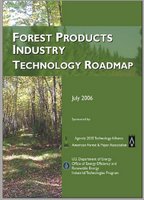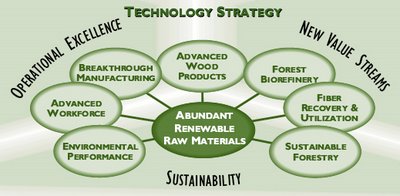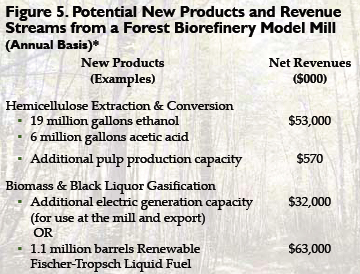Renaissance of the Forest Products Industry
Often maligned as a exploiter of America's forests, the Forest Products Industry (FPI) may be "behind the times" in some contexts, but it has great potential for leading the paradigm shift to renewable energy (both electricity and biofuels), reducing greenhouse gases, upgrading the nation's workforce, reducing dependence on fossil fuels, and suppressing the spread of tree diseases and forest fires due in part to global warming. Recently released is the Forest Products Industry Technology Roadmap which provides a framework for reinventing and reinvigorating the industry through technological innovations in processes, materials, and markets. The 2006 update of the publication captures the Agenda 2020 Technology Alliance* vision and translates it into a set of focus areas and R&D priorities for each Agenda 2020 technology platform. The Roadmap provides a summary of priority technical challenges and research needs of the U.S. forest products industry, and highlights opportunities for partnerships with researchers and funding organizations.
Recently released is the Forest Products Industry Technology Roadmap which provides a framework for reinventing and reinvigorating the industry through technological innovations in processes, materials, and markets. The 2006 update of the publication captures the Agenda 2020 Technology Alliance* vision and translates it into a set of focus areas and R&D priorities for each Agenda 2020 technology platform. The Roadmap provides a summary of priority technical challenges and research needs of the U.S. forest products industry, and highlights opportunities for partnerships with researchers and funding organizations.
Seven Technology Platforms Provide Focus for RD&D
1. Advancing the Forest “Bio-Refinery”
2. Sustainable Forest Productivity
3. Breakthrough Manufacturing Technologies
4. Advancing the Wood Products Revolution
5. Next Generation Fiber Recovery and Utilization
6. Positively Impacting the Environment
7. Technologically Advanced Workforce
As the publication states, the inescapable truth is that "America is the world’s largest producer and consumer of forest products. The industry is a vital contributor to the domestic economy, particularly in rural areas where many pulp and paper mills are located. In 2004, U.S. paper and wood products companies posted annual sales of close to $260 billion and employed almost one million Americans. Despite decades as a global leader, the industry is increasingly challenged by international competitors, who in some cases enjoy economic advantages in wood, labor, and environmental costs. Other competitive pressures include the growing use of electronic communication and advertising, product substitution, an aging process infrastructure, few technology breakthroughs, and scarcity of capital for new investments."
The time for a technological renaissance is now. Not only is demand for change the greatest that it has ever been, but also the "aging process infrastructure" of the industry is reaching the end of its lifecycle. Due to be replaced are Tomlinson boilers and other biomass- or fossil fuel-based boilers that are used for energy production and chemical recovery.  The FPI is calling for new investment in what it calls "Forest Biorefineries." Utilizing emerging technologies, these "optimized forest biorefineries would produce new streams of biomass-derived, high-value chemicals, fuels, and electric power while continuing to meet the growing demand for traditional wood, pulp, and paper products. This evolution could more than double economic returns on the industry’s manufacturing assets, create a significant U.S. manufacturing base for renewable transportation fuels, and help meet the nation’s need for clean, diverse, domestic energy supplies."
The FPI is calling for new investment in what it calls "Forest Biorefineries." Utilizing emerging technologies, these "optimized forest biorefineries would produce new streams of biomass-derived, high-value chemicals, fuels, and electric power while continuing to meet the growing demand for traditional wood, pulp, and paper products. This evolution could more than double economic returns on the industry’s manufacturing assets, create a significant U.S. manufacturing base for renewable transportation fuels, and help meet the nation’s need for clean, diverse, domestic energy supplies."
In addition to fulfilling functions such as providing combined process heat and power and/or recovering the pulping chemicals for re-use, the gasifiers would produce syngas, consisting largely of hydrogen and carbon monoxide. Depending on the economics of the situation, the syngas could then be burned in gas turbines to produce steam and power, used as a replacement for fossil fuels (such as natural gas in a lime kiln or fuel oil in a power boiler), or converted into transportation fuels, including Fischer-Tropsch liquid fuels or pure hydrogen. *The Agenda 2020 Technology Alliance is an industry-led partnership with government and academia that holds the promise of reinventing the forest products industry through innovation in processes, materials and markets. Initiated in 1994 in partnership with the U.S. Department of Energy (DOE) to improve energy efficiency in the industry's manufacturing processes, Agenda 2020 is now organized as a membership alliance to accelerate research, demonstration and deployment of breakthrough technologies.
*The Agenda 2020 Technology Alliance is an industry-led partnership with government and academia that holds the promise of reinventing the forest products industry through innovation in processes, materials and markets. Initiated in 1994 in partnership with the U.S. Department of Energy (DOE) to improve energy efficiency in the industry's manufacturing processes, Agenda 2020 is now organized as a membership alliance to accelerate research, demonstration and deployment of breakthrough technologies.
technorati wood, feedstock, conversion, biofuels, biorefineries, forests, sustainability



No comments:
Post a Comment